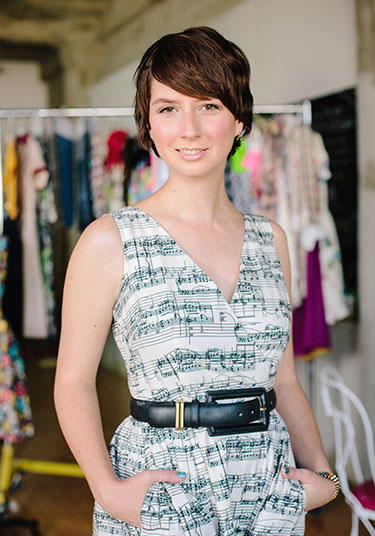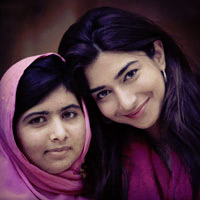Many of us have heard of the wildly successful fashion company ModCloth, but did you know that it was co-founded by a millenial? Susan Gregg Koger’s love for thrifting and everything vintage led her and her boyfriend at the time and now husband Eric Koger to create the company. What started as a dorm room project at Carnegie Melon turned into a nationally recognized fashion company, with locations in San Francisco, Los Angeles, and Pittsburgh. One of the unique aspects of ModCloth is the company’s involvement with its customers. By encouraging feedback and listening to recommendations, they have generated a loyal team of brand ambassadors. One way Kroger involves customers into ModCloth’s story is by featuring outfit photos on the site with the product pictures. People browsing for clothing can not only see what the clothing and accessories look like on mannequins and models, but on everyday people and see how they like the fit. Her online business now features over 300 designers and Koger herself has generated $15 million through her company.
Author Archive for Sarah Wishing
When she was on a trip to India, Kavita Shukla accidentally drank some tap water. To prevent her from getting ill, her grandmother concocted a home remedy spiced tea. Starting with a middle school science project and following it up with years of research, Shukla found a new and remarkable use for her grandmother’s spices, and found an uncanny way of keeping food fresh! By infusing the spices into paper, then putting that sheet in with fresh produce, it was able to keep produce fresh for 2-4 times longer than normal. She found that some of the spices in the tea had an element which stopped the growth of fungus and bacteria. Many people do not have access to refrigeration, and FreshPaper is a safe and inexpensive way to make fresh produce last longer. With no harmful chemicals, FreshPaper is made with edible, organic, botanical extracts. To see if her product would actually work, she handed it out to people at farmers markets, and the results proved to be true for them too. Her company targets those in most need: people in developing countries as well as food banks and pantries. To learn more about her product, watch Kavita Shukla’s TED talk here.
While she was traveling the world, Lauren Bush Lauren couldn’t help but notice the staggering amounts of children dealing with hunger. However, she saw the dramatic effect that one school meal could have on the improvement of a child’s hunger and health. Combining her love for fashion and charity, she launched her company FEED in 2007. Her line of products would be able to make a dent in ending worldwide hunger in a tangible way. Each one of her fashion accessories gets stamped with a number which represents the amount of meals or micronutrient packets that will be provided upon purchasing the product. Not only does her business help children in need worldwide, but she employs people in need under fair labor conditions in regions such as Columbia, Guatemala, Haiti, India and Kenya. She teaches them how to be artisans and gives them hope for their future while simultaneously providing for starving children. With her passion for fashion and food, Lauren Bush Lauren was able to start a company with a tremendous social giveback.
Clara Brenner is the cofounder and CEO of Tumml, an organization which seeks to fund entrepreneurs looking to solve urban problems. Think of her company as a Shark Tank for urban corporations: they fund business start-ups that prove to have to potential for improving life in cities across the board. Recognizing that cities have always had complications socially and economically, she looked for a way to fix these issues in a strong and lasting way. Instead of starting one business, she decided to start a business which would then start many other businesses. Brenner’s specific position is to build national presence. To determine whether a business would be beneficial to cities, they look for 10 specific, pressing urban challenges needing to be fixed:
- Natural Resources and Sustainability
- Transportation and Housing
- Public Health and Safety
- Local Food Systems
- Arts and Culture
- Civic Participation
- Workforce and Equality
- Education
- Local economic Growth
- Informal Economy
Tumml has helped launch 33 portfolio companies, has raised over 35 million dollars to fund startups, has created over 280 jobs, impacted 69 urban areas, and has touched 2.2 million lives. Clearly Clara Brenner is a millenial entrepreneur who has succeeded immensely.
With the crisis of malnutrition and lack of food posing a huge threat to the people of Rwanda, Julie Carney looked for a way to end this problem in a way that would be long-lasting and environmentally friendly. Having help from Emma Clippinger, and Dr. Emily Morell Balkin, she started the company Gardens for Health to tackle childhood chronic malnutrition. Through their company, they seek to change the way that malnutrition is treated by implementing agricultural systems. How they go about this process is partnering with health centers in Rwanda to incorporate agricultural support and health education. They stress the importance of developing a strong agricultural system in communities as a primary force to end malnutrition. They train government Nutritionists, Agronomists, Community Health Workers and Village Agriculture Promoters with their model for creating sustainable farms in communities. So far Carney’s business has reached nearly 4,000 families through her Health Center Program, which means that approximately 15,7000 people have access to healthy food. In 2015, 2,542 children have enrolled into the program. Since starting her business, Julie Carney has stepped down from the lead role in Gardens for Health, but remains an active business partner.
Malala Yousafzai was a 15 year old advocating for education for girls when she was shot by the Taliban. Despite being attacked in such a brutal way by these terrorists, she continued her campaign for education. However she was still so young and didn’t know the world of business and didn’t quite know how to run such a program, so 24-year-old Shiza Shahid stepped in as her business partner and mentor and founded the Malala Fund. Shahid was born in the capital of Pakistan, Islamabad, and from a young age shared the same passion for education especially in regards to women. When she was a teenager, she spent her time helping children born to women in prison and volunteered at a relief camp. When she was 18 years old she received a scholarship to Stanford University and moved to California to further her education. Never forgetting her home country, she kept up with the education system in Pakistan and women’s rights over there. While she was in college, the Taliban took over Pakistan and bombed over 2,000 schools for girls, putting a ban on education for girls. Hearing Malala’s story and finding out she was shot, she flew over to the hospital in England where she was transferred and was there for her ever since. With her background, experience, and education, Shahid knew how to set up a scholarship fund for girls in need seeking to learn. She utilized the celebrity and media attention brought in by Malala’s story and turned it into a business to actually help girls in Pakistan. Through the Malala Fund, Shahid has raised over $400K. The fund has three goals: storytelling, public support, and supporting entrepreneurs in regions where girls don’t have access to education. With her passion for business, education, and charity, Shiza Shahid is a millenial entrepreneur worthy of notice.
Copyright © 2025 All Rights Reserved






